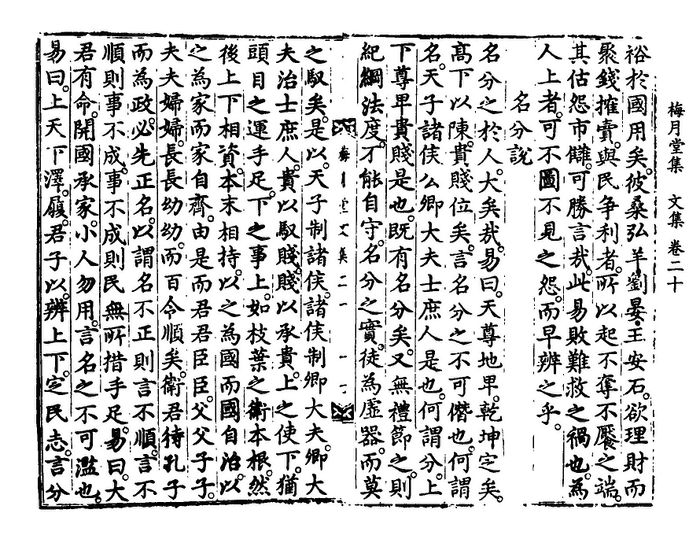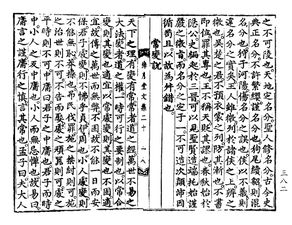(Translation) 金時習 名分說
| Primary Source | ||
|---|---|---|
 |
Title | |
| English | ||
| Chinese | 名分說 | |
| Korean(RR) | 명분설(Myŏngbunsŏl [Myeongbunseol]) | |
| Text Details | ||
| Genre | Literati Writings | |
| Type | 說 | |
| Author(s) | 金時習 | |
| Year | ||
| Source | Korean Classics and Literati's Collection of Writings (한국고전종합DB) | |
| Key Concepts | ||
| Translation Info | ||
| Translator(s) | Participants of 2019 JSG Summer Hanmun Workshop (Advanced Translation Group) | |
| Editor(s) | ||
| Year | 2019 | |
목차
- 1 Introduction
- 2 Original Script
- 3 Discussion Questions
- 4 Further Readings
- 5 References
- 6 Translation
- 6.1 (sample) : Jaeyoon Song
- 6.2 Student 1 : (Yishu Ma)
- 6.3 Student 2 : Samuel Sai Hay Chan 陳世熙 진세희
- 6.4 Student 3 : Younès M'Ghari
- 6.5 Student 4 : King Kwong Wong
- 6.6 Student 5 : (신동조)
- 6.7 Student 6 : (Stacey Lui)
- 6.8 Student 7 : Russell Guilbault
- 6.9 Student 8 : Q
- 6.10 Student 9 : (Write your name)
- 6.11 Student 10 : (Write your name)
- 6.12 Student 11 : YeonJae Ra
- 6.13 Student 12 : Wonhee Cho 趙元熙
Introduction
Original Script
| Classical Chinese | English |
|---|---|
|
名分之於人。大矣哉。易曰。天尊地卑。乾坤定矣。高下以陳。貴賤位矣。言名分之不可僭也。何謂名。天子諸侯公卿大夫士庶人是也。何謂分。上下尊卑貴賤是也。旣有名分矣。又無禮節之。則紀綱法度。不能自守。名分之實。徒爲虛器。而莫之馭矣。 是以。天子制諸侯。諸侯制卿大夫。卿大夫治士庶人。貴以馭賤。賤以承貴。上之使下。猶頭目之運手足。下之事上。如枝葉之衛本根。然後上下相資。本末相持。以之爲國而國自治。以之爲家而家自齊。由是而君君臣臣。父父子子。夫夫婦婦。長長幼幼。而百令順矣。衛君待孔子而爲政。必先正名。以謂名不正則言不順。言不順則事不成。事不成則民無所措手足。 易曰。大君有命。開國承家。小人勿用。言名之不可濫也。易曰。上天下澤。履。君子以辨上下。定民志。言分之不可陵也。天地定名分。聖人修名分。古今史典正名分。不許繁纓。謹名分也。 狗尾續貂。則混名分也。狩于河陽。傷名分之誤也。侯以不義。則違名分之實矣。王人雖微。列於諸侯之上。辨之微也。吳楚之君。不預衣裳之列。防其漸也。不書卽位。罪其專也。王不稱天。貶其謬也。春秋始於隱公。史編起於三晉。可以見聖賢造端托始謹嚴之微旨。而名分之定于一。不可造次顚沛因循苟且。以故爲舛錯也。 |
(translation) |
Discussion Questions
Further Readings
References
1. 司馬光, <<資治通鑑>>卷第一 https://ctext.org/wiki.pl?if=gb&chapter=579652
2. 김시습 in 한국민족대백과사전(Encyclopedia of Korean Culture, in Korean). http://encykorea.aks.ac.kr/Contents/Index?contents_id=E0009666
Translation
(sample) : Jaeyoon Song
- Discussion Questions:
Student 1 : (Yishu Ma)
What the title and distinction mean to people really matters. The Book of Change says, "The sky is superior and the earth is inferior. Thus has the universe been fixed, have the superiority and inferiority been set, and have the high and low status of people been posited. This book claims that the title and distinction shouldn't be overstepped by people. What is called as the title are the son of heaven, the dukes, the ministers, the senior officials, and the common people. What is called as the distinction are the high and low status, superiors and inferiors, superiority and inferiority. Now that there are titles and the distinction, but there are no rituals to regulate them. Thereupon, the rules and standards cannot be protected. The fact of the titles and distinction is in vain as empty vessels. And no one could control them.
Student 2 : Samuel Sai Hay Chan 陳世熙 진세희
Great are title and distinction to people. The Book of Change states, “The heaven is supreme, and the earth is humble. Thus are they destined to be. Things high and low correspond to nobility and humility." Therefore, title and distinction must not to be subverted. What is “title”? It is the titles of the Son of Heaven, Dukes, Marquis, and Grand master. What is “distinction”? It is the distinction between the high and low, the respected and scorned, and the noble and humble. If you have title and distinction but do not realize them with rituals, the institution and laws [of the state] cannot be preserved. The reality of title and distinction becomes empty vessel. In that case, society can no longer be governed.
Student 3 : Younès M'Ghari
Grands sont les dénominations et statuts pour les Hommes. Le Livre des transformations dit : "Le Ciel est vénérable et la Terre est basse, le Cosmos a (ainsi) été disposé. [...]." Ce qui est appelé "dénomination" : fils du ciel, duc, marquis, ministre, haut fonctionnaire, bureaucrate, roturier. Ce qui est appelé "statut" : supérieur et inférieur, riche et pauvre. Si
Student 4 : King Kwong Wong
As to titles and distinctions to people, it is of great importance. The Book of Change states, "The Heaven is lofty and the Earth is base, thus the Qian and Kun are destined. Put the hgh and low on display, the noble and ignoble ones thus had their places accordingly." This means that one cannot overstep the meaning of our titles and distinctions. What are titles? They are the Son of Heaven, his vassals, his ministers, his soldiers, and his subjects. What are distinctions? They are the high and low, the lofty and base, and the noble and ignoble. If there are titles and distinctions, but without ritual to regulate them, then the law and statuates will not be able to maintain themselves. The heart of titles and distinctions, in vein becomes empty vessel. And there is no way one can control it.
Student 5 : (신동조)
To man, the titles and duties (mingfen) are important. It is stated in the Book of Change that Heaven is honorable and the Earth is lowly. The two are settled.... You cannot overstate mingfen. How do we discuss ming? This is of the relationship between emperors, lords, high officials, men of noble, and lowly men. How do we discuss fen? This is of the relationship between the high and the low, the honorable and the vulgar, the precious and the base. If you don't control it even after having ming, then you cannot maintain discipline and regulations, the heart of ming and fen. Then everything goes useless. Nobody can control it after all.
Student 6 : (Stacey Lui)
Titles and distinction are of great importance to people. The Book of Changes states: []. This means we cannot overstep the limits of titles and distinction. What do we refer to as titles? This includes emperors, feudal lords, ministers, grand marquis, warriors and the common people. What do we refer to as distinction? This includes high and low, the venerable and vulgar, the precious and disparaged. If there are only titles and distinction, without rituals to regulate them, then discipline and structures cannot be governed. Titles and distinction, in reality, will become empty vessels and no-one will be able to control them.
Student 7 : Russell Guilbault
Among people, title and distinction is a great matter. The Yijing says: "Heaven is venerable and the earth is base. Thus are gan and kun settled. The higher and lower are displayed [?]; thus the noble and mean have their places." It is speaking of the impossibility of overstepping title and distinction. What is title? It is: Son of Heaven, lord, duke, marquis, minister, soldier, commoner. What is distinction? It is upper and lower, venerable and base, noble and mean. If one only has title and distinction, but does not control it with ritual, then one cannot protect discipline and regulations by oneself. This is the essence of title and distinction; in vain it becomes an empty vessel, and nobody can control it.
Student 8 : Q
Titles and Social Distinctions are of great importance to people. [Legge's translation will be used.] This is to say that the boundaries established by Titles and Social Distinctions cannot be violated. Then, what does "Titles" mean here? It refers to titles in the sense of "emperors," "lords," "officials," "grand masters," and "commoners."
Student 9 : (Write your name)
Student 10 : (Write your name)
Student 11 : YeonJae Ra
名分之於人。大矣哉。易曰。天尊地卑。乾坤定矣。高下以陳。貴賤位矣。言名分之不可僭也。何謂名。天子諸侯公卿大夫士庶人是也。何謂分。上下尊卑貴賤是也。旣有名分矣。又無禮節之。則紀綱法度。不能自守。名分之實。徒爲虛器。而莫之馭矣。
To people, names and distinction is great (thing). The book of changes says, “The heaven is high and the earth is low. Thus 乾(heaven) and 坤(earth) is set. As the high and the low are arranged, the noble and the humble also placed.” This is saying that ‘names and distinction, those could be not overplaced.’ What is the name? It is the emperor, the lord, the duke, the minister, the Kyŏngdaebu, the common. What is the distinction? It is up and down, high and low, noble and humble. Originally there is names, also there is no rituals to restrain itself. It means disciplines, rules. It could not be self protected. The core of names and distinction in vain changes to empty vessel, it could not be controlled.
Student 12 : Wonhee Cho 趙元熙
"Titles" and "distinction," these are paramount to people. 易曰... This means that titles and distinction cannot be violated. What do "titles" refer to? The Son of Heaven, Dukes, Ministers, Scholars, commoners, these are the examples of "titles. What does "distinction" refer to? Upper and lower, respected and vulgar, noble and debased are examples of 'distinction." If there are only "titles" and "distinctions," but not regulated by proper conduct (li 禮), then moral standards and laws cannot protect themselves. The core of "titles" and "distinctions" will become empty vessels, and there will be no way to reign them.
